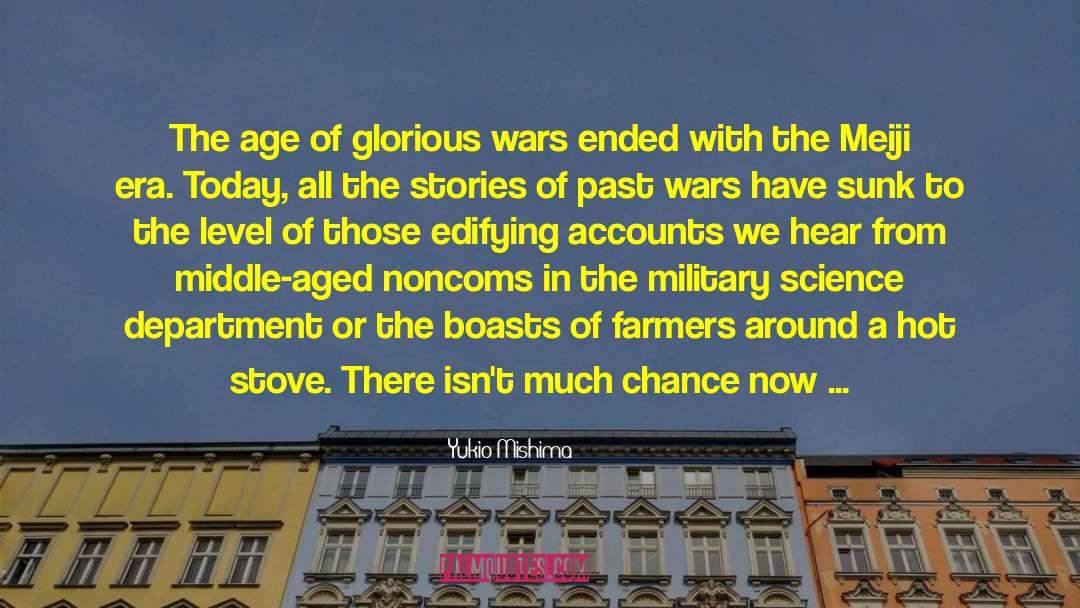Quotes About Meiji
Enjoy collection of 17 Meiji quotes. Download and share images of famous quotes about Meiji. Righ click to see and save pictures of Meiji quotes that you can use as your wallpaper for free.
Ever since the Meiji restoration in 1868, Japan has turned its back on Asia in general and China in particular: its pattern of aggression from 1895 onwards and the colonies that resulted were among the consequences. ~ Martin Jacques
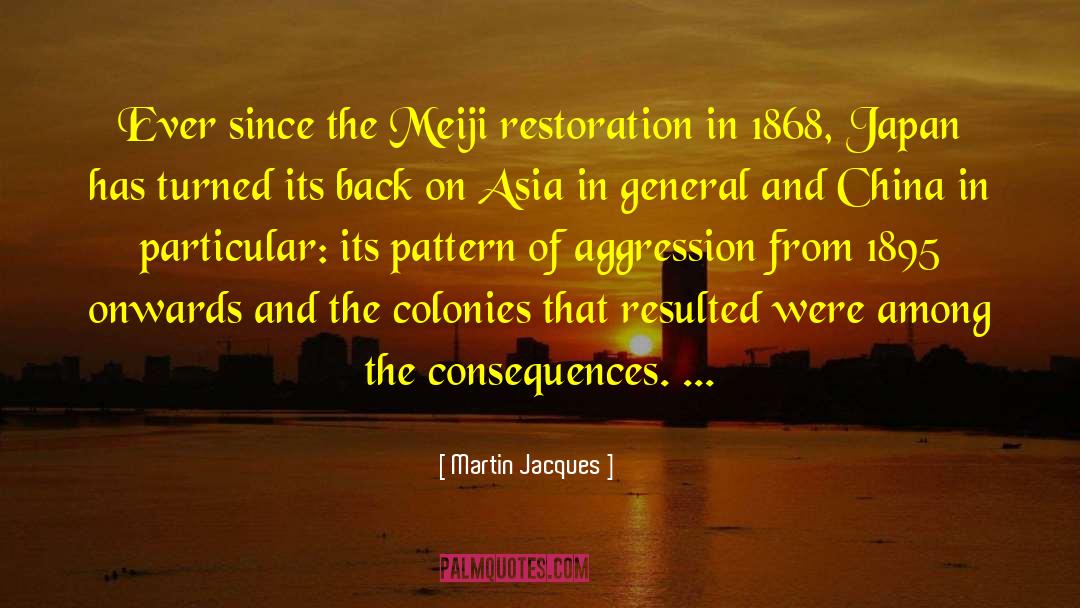
1. A Cup of Tea
Nan-in, a Japanese master during the Meiji era (1868-1912), recieved a university professor who came to inqure about Zen.
Nan-in served tea. He poured his visitor's cup full, and then kept on pouring.
The professor watched the overflow until he could no longer restrain himself. "It is overfull. No more will go in!"
"Like this cup," Nan-in said, "you are full of your own opinions and speculations. How can I show you Zen unless you first empty your up? ~ Nyogen Senzaki
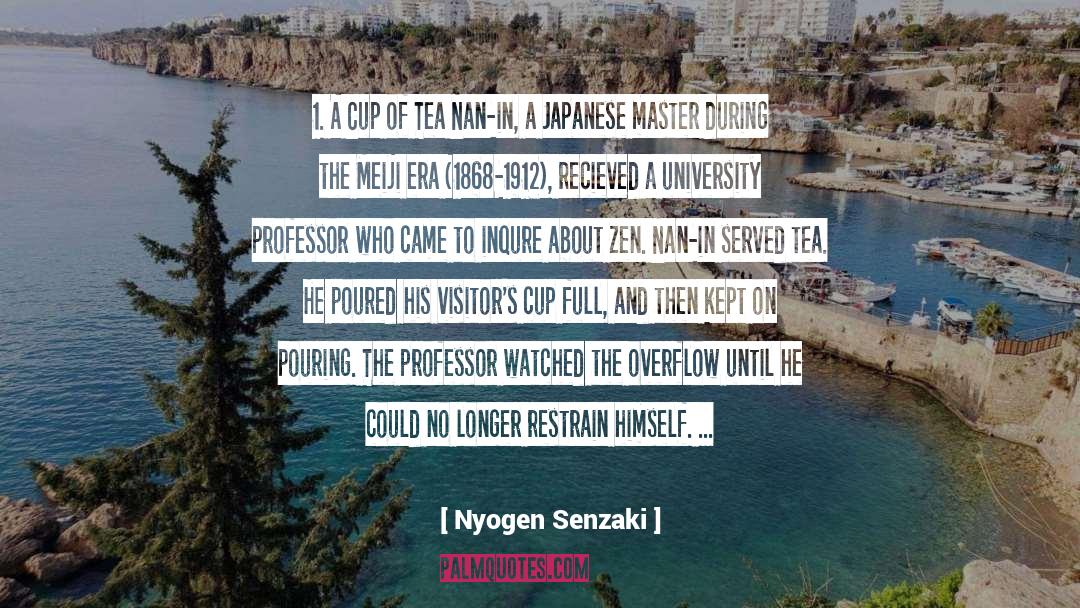
13. A Buddha
In Tokyo in th Meiji era there lived two prominent teachers of opposite characteristics. One, Unsho, an instructor in Shingon, kept Buddha's precepts scrupulously. He never drank intoxicants, nor did he eat after eleven o'clock in the morning. The other teacher, Tanzan, a professor of philosophy at the Imperial University, never observed the precepts. When he felt like eating he ate, and when he felt like sleeping in the daytime he slept.
One da Unsho visited Tanzan, who was drinking wine at the time, not even a drop of which is supposed to touch the tongue of a Buddhist.
"Hello, brother," Tanzan greeted him. "Won't you have a drink?"
"I never drink!" exclaimed Unsho solemnly.
"One who never drinks is not even human," said Tanzan.
"Do you mean to call me inhuman just because I do not indulge in intoxicating liquids!" exclaimed Unsho in anger. "Then if I am not human, wht am I?"
"A Buddha," answered Tanzan. ~ Nyogen Senzaki
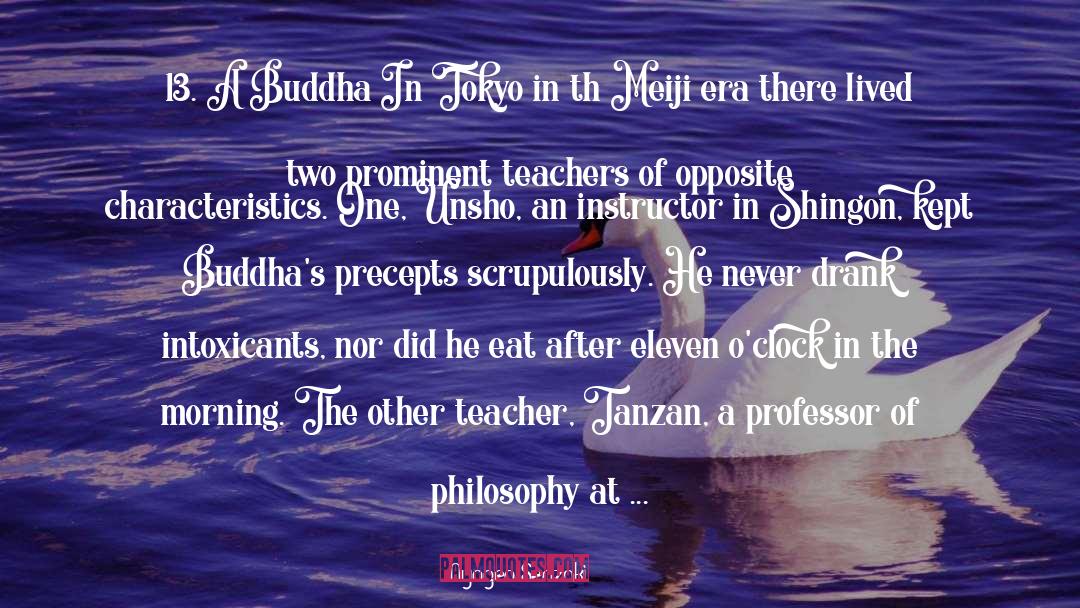
After the Meiji restoration in 1868, Japan adopted an expansionist and colonial attitude towards its neighbours. It sought to identify itself with the West and looked down upon the Asian continent as backward and inferior. For most of the next 70 years, Japan was at war, mainly with its neighbours. ~ Martin Jacques
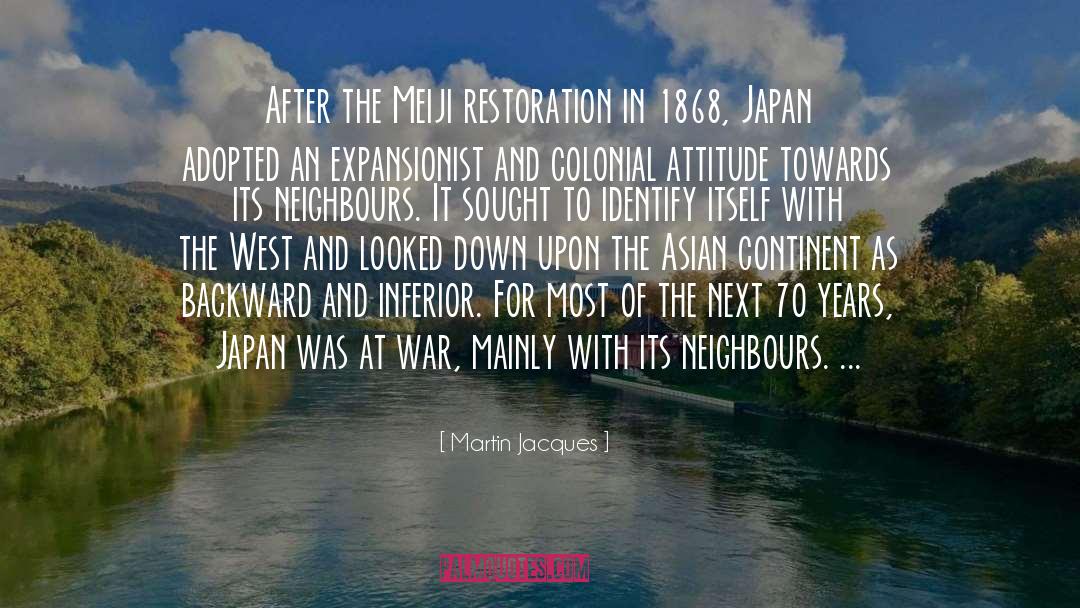
But once I could look back on it in a calmer frame of mind, it struck me that his motive was surely not so simple and straightforward. Had it resulted from a fatal collision between reality and ideals? Perhaps - but this was still not quite it. Eventually, I began to wonder whether it was not the same unbearable loneliness that I now felt that had brought K to his decision. ~ Soseki Natsume
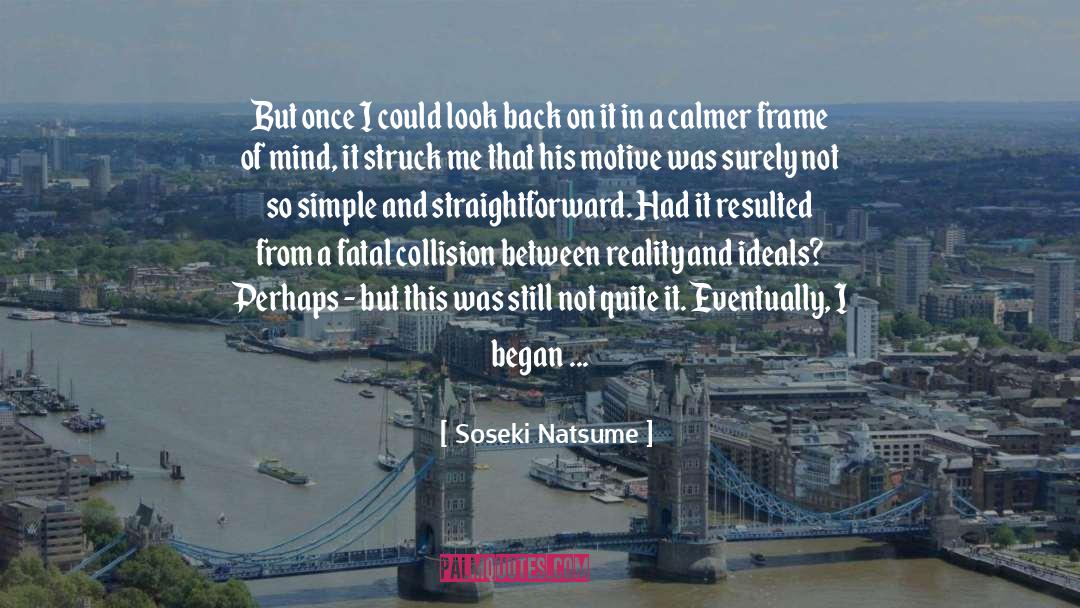
What do I want to be when I grow up? An attractive role would be that of the bunjin. He is the Japanese scholar who wrote and painted in the Chinese style, a literatus, something of a poetaster - a pose popular in the 18th century. I, however, would be a later version, someone out of the end of the Meiji, who would pen elegant prose and work up flower arrangements from dried grasses and then encourage spiders to make webs and render it all natural. For him, art is a moral force and he cannot imagine life without it. He is also the kind of casual artist who, after a day's work is done, descends into his pleasure park and dallies. ~ Donald Richie
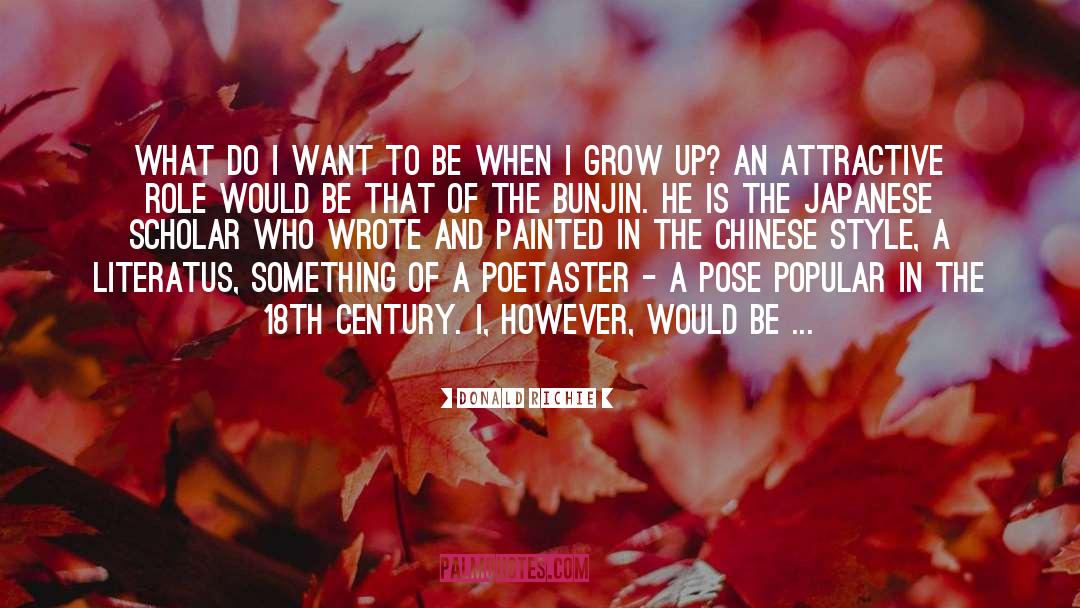
It was Daisuke's conviction that all morality traced its origins to social realities. He believed there could be no greater confusion of cause and effect than to attempt to conform social reality to a rigidly predetermined notion of morality. Accordingly, he found the ethical education conducted by lecture in Japanese schools utterly meaningless. In the schools, students were either instructed in the old morality or crammed with a morality suited to the average European. For an unfortunate people beset by the fierce appetites of life, this amounted to nothing more than vain, empty talk. When the recipients of this education saw society before their eyes, they would recall those lectures and burst out laughing. Or else they would feel that they had been made fools of. In Daisuke's case it was not just school; he had received the most rigorous and least functional education from his father. Thanks to this, he had at one time experienced acute anguish stemming from contradictions. Daisuke even felt bitter over it. ~ Natsume Sōseki
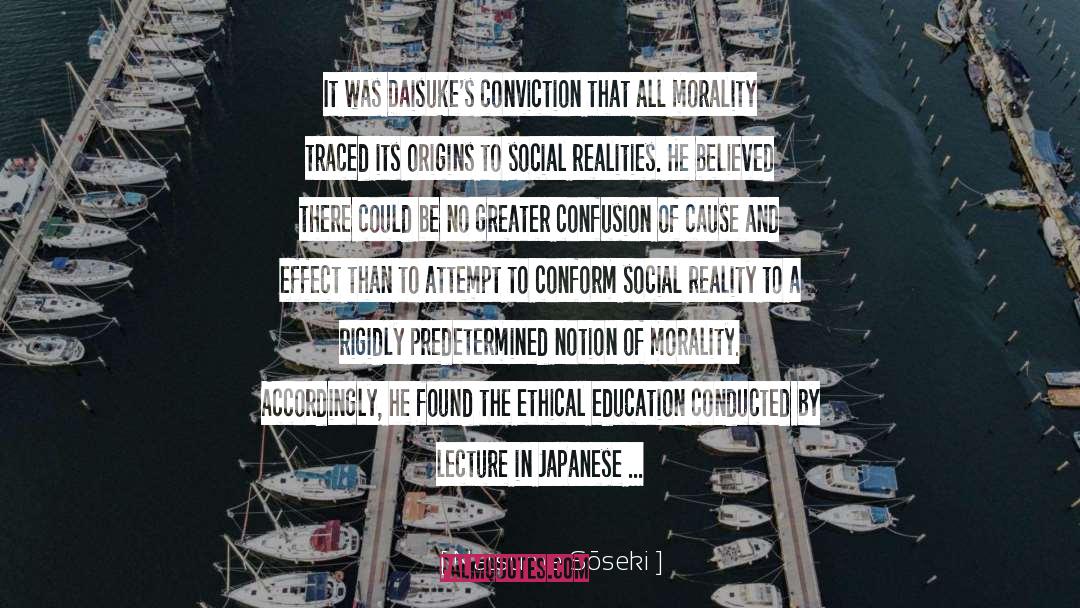
Daisuke was of course equipped with conversation that, even if they went further, would allow him to retreat as if nothing had happened. He had always wondered at the conversations recorded in Western novels, for to him they were too bald, too self indulgent, and moreover, too unsubtly rich. However they read in the original, he thought they reflected a taste that could not be translated into Japanese. Therefore, he had not the slightest intention of using imported phrases to develop his relationship with Michiyo. Between the two of them at least, ordinary words sufficed perfectly well. But the danger was of slipping from point A to point B without realizing it. Daisuke managed to stand his ground only by a hair's breadth. When he left, Michiyo saw him to the entranceway and said, "Do come again, please? It's so lonely. ~ Soseki Natsume
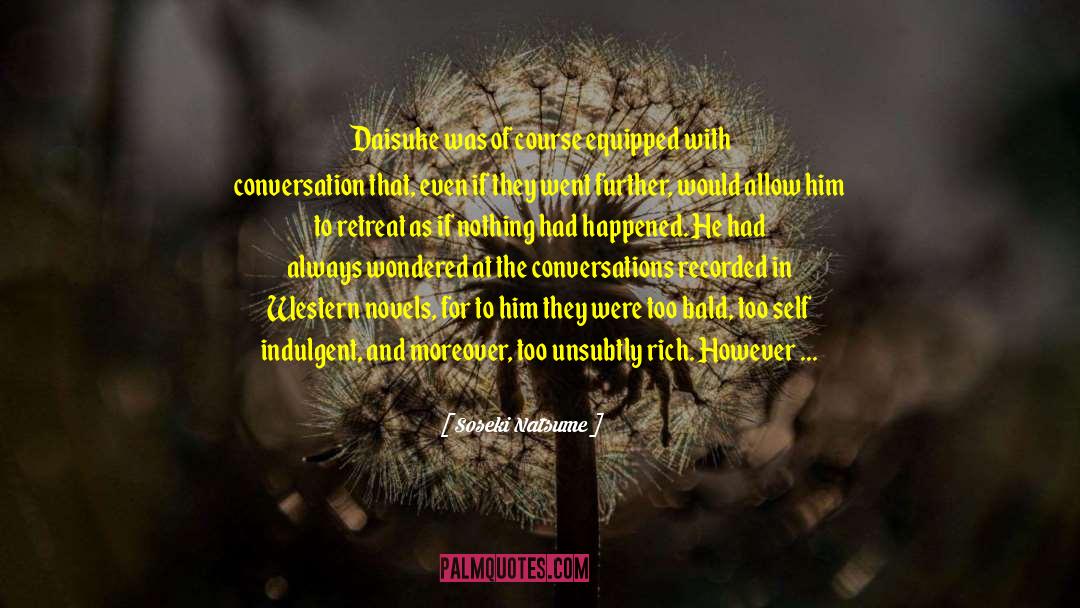
And yet, as you all know, joining humanity is never a simple matter. By beginning to live the same temporality as Westerners, the Japanese now had to live two temporalities simultaneously. On the one hand, there was Time with a capital "T," which flows in the West. On the other hand, there was time with a small "t," which flows in Japan. Moreover, from that point on, the latter could exist only in relation to the former. It could no longer exist independently, yet it could not be the same as the other, either. If I, as a Japanese, find this new historical situation a bit tragic, it's not because Japanese people now had a live in two temporalities. It's rather because as a result of having to do so, they had no choice but to enter the asymmetrical relationship that had marked and continues to mark the modern world - the asymmetrical relationship between the West and the non-West, which is tantamount, however abstractly, to the asymmetrical relationship between what is universal and all the rest that is merely particular. ~ Minae Mizumura
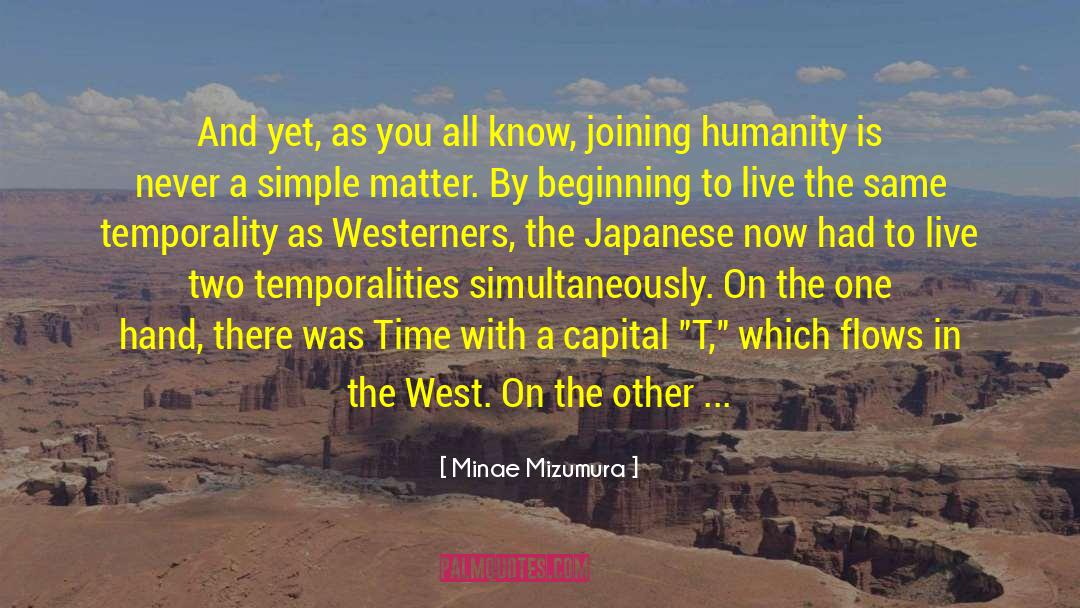
Anyone who sang the praises of undying love in this day and age belonged to the first rank of hypocrites in Daisuke's estimate. ~ Soseki Natsume
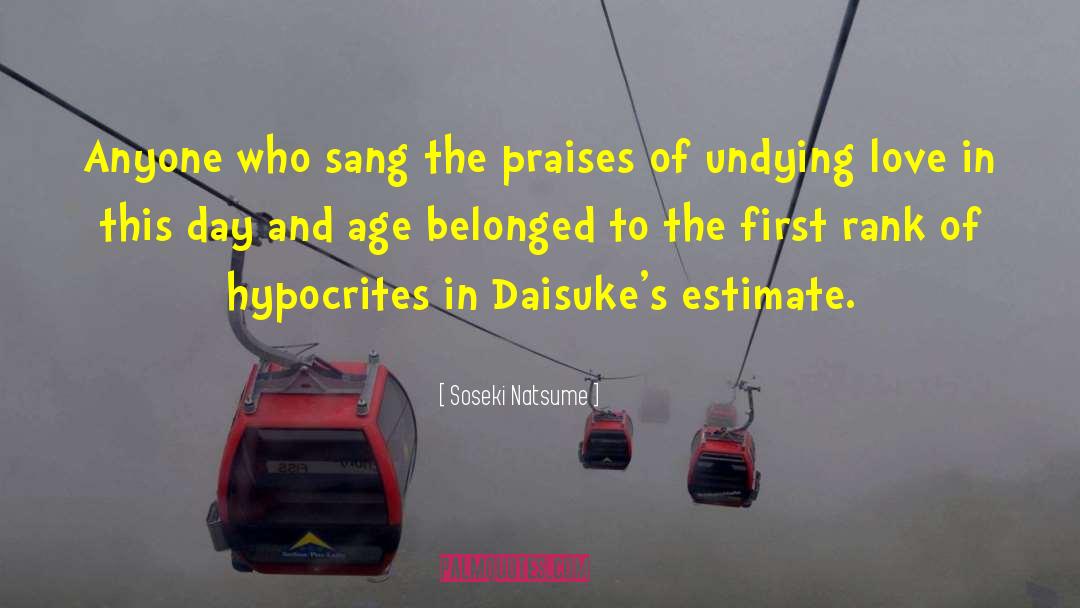
Hirota feels strongly drawn toward nature and the natural, is hyper-sensitive to the artificial - particularly that most cramped and constraining man-made creation, society - and does his best to avoid it. ~ Soseki Natsume
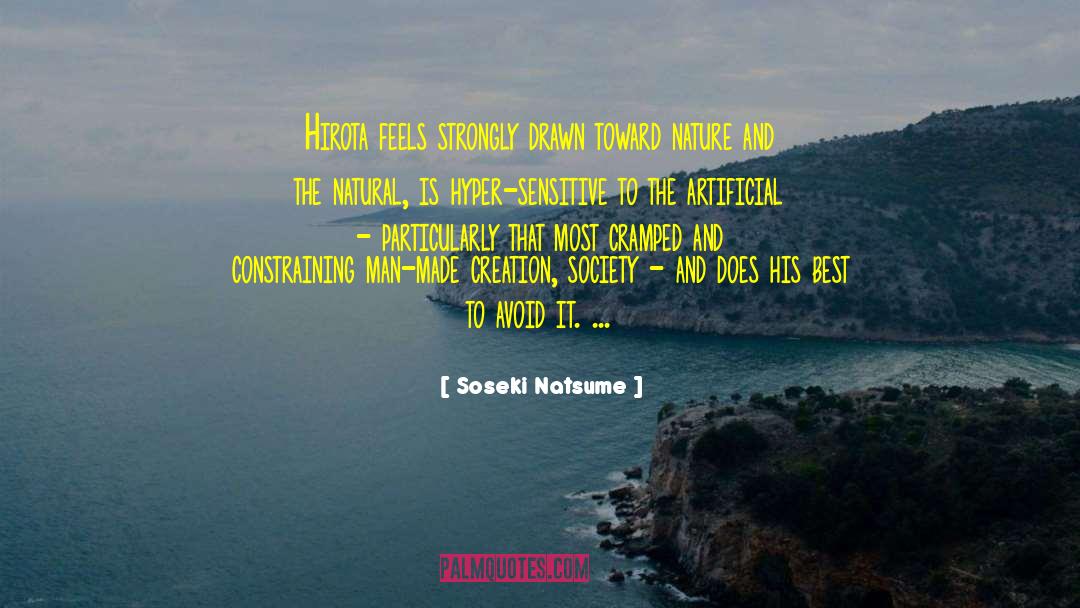
But do you imagine there's a certain type of person in the world who conforms to the idea of a 'bad person'? You'll never find someone who fits that mold neatly, you know. On the whole, all people are good, or at least they're normal. The frightening thing is that they can suddenly turn bad when it comes to the crunch. That's why you have to be careful. ~ Soseki Natsume
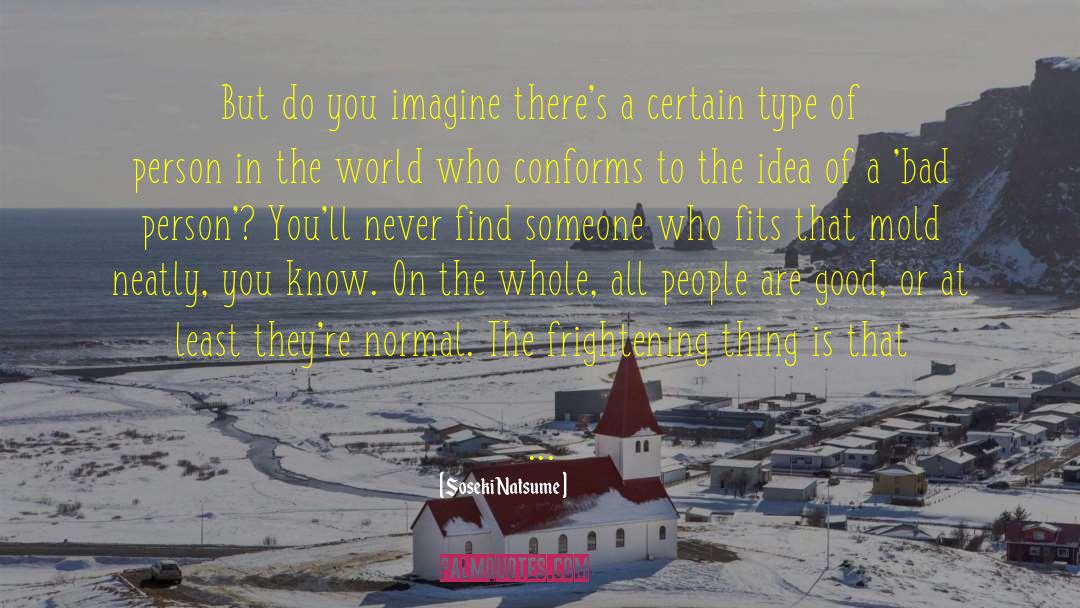
...He said defensively, "But from now on, Japan is sure to develop."
"Japan's headed for a fall," the man said coolly.
Say a thing like that in Kumamoto and you'd get a punch in the nose, or be called a traitor. The atmosphere Sanshiro grew up in left no room in his head for such an idea. Just because he was young, was the man having some fun at his expense? The man kept on grinning. Yet his way of talking was perfectly composed. Not knowing what to think, Sanshiro held his tongue.
His companion went on, "Tokyo is bigger than Kumamoto. Japan is bigger than Tokyo. And what's bigger than Japan is..." He paused and looked at Sanshiro, who was listening intently. "...the inside of your head. That's bigger than Japan. Don't let yourself get bogged down. You may believe your way of thinking is for the good of the nation, but you could actually be bringing it down."
When he heard this, Sanshiro felt he had indeed left Kumamoto. And he realized, too, what a small person his Kumamoto self had been. ~ Natsume Sōseki

The independence of a nation springs from the independent spirit of its citizens ~ Alan Macfarlane
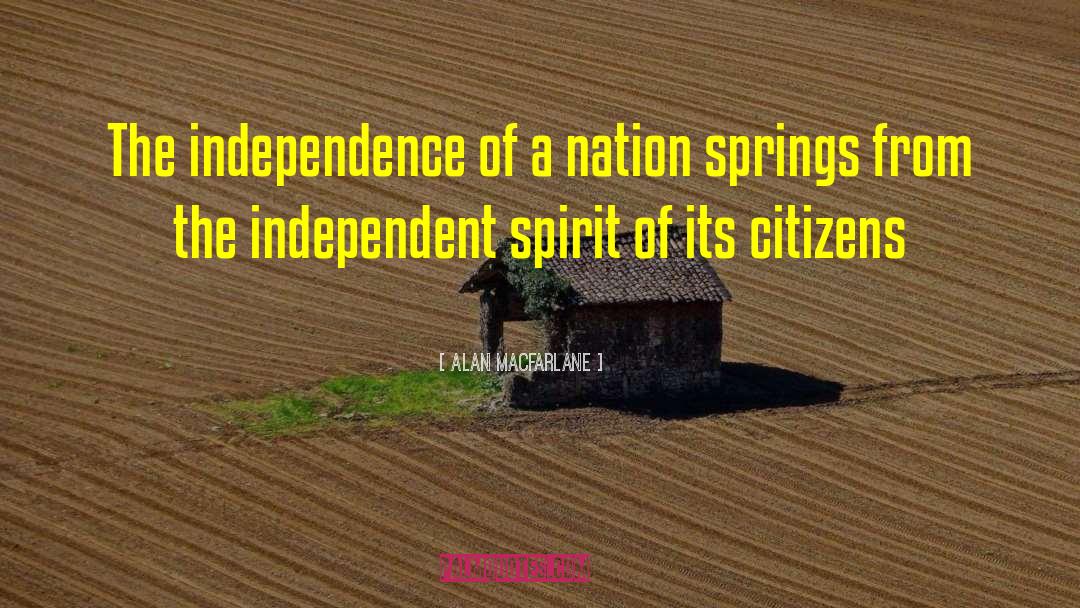
A Cup of Tea Nan-in, a Japanese master during the Meiji era (1868-1912), received a university professor who came to inquire about Zen. Nan-in served tea. He poured his visitor's cup full, and then kept on pouring. The professor watched the overflow until he no longer could restrain himself. "It is overfull. No more will go in!" "Like this cup," Nan-in said, "you are full of your own opinions and speculations. How can I show you Zen unless you first empty your cup? ~ Taka Washi
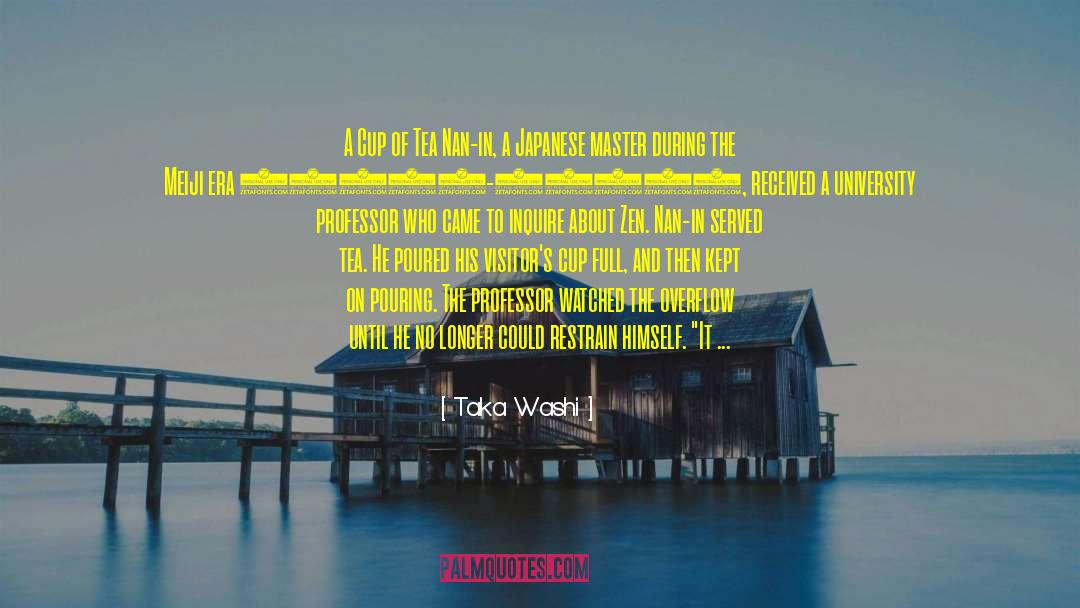
During the Meiji era, the Japanese Zen master, Nan-in had a visitor from a respected university – a professor who wanted to learn about Zen.
Nan-in served the professor a pot of tea, but when the cupwas full, he continued pouring until the cup was overflowing. The startled professor watched in amazement until he could no longer restrain himself from intervening, "The cup is full and no more will go in. You're making a mess!" "Like this cup," Nan-insaid, "You are full of your own opinions, artificial concepts and negative speculations. How can I show you Zen unless you first empty your cup?"
Like the learned professor who wanted to understand spirituality, you too must empty your cup and have an open mind and heart. ~ Christopher Dines
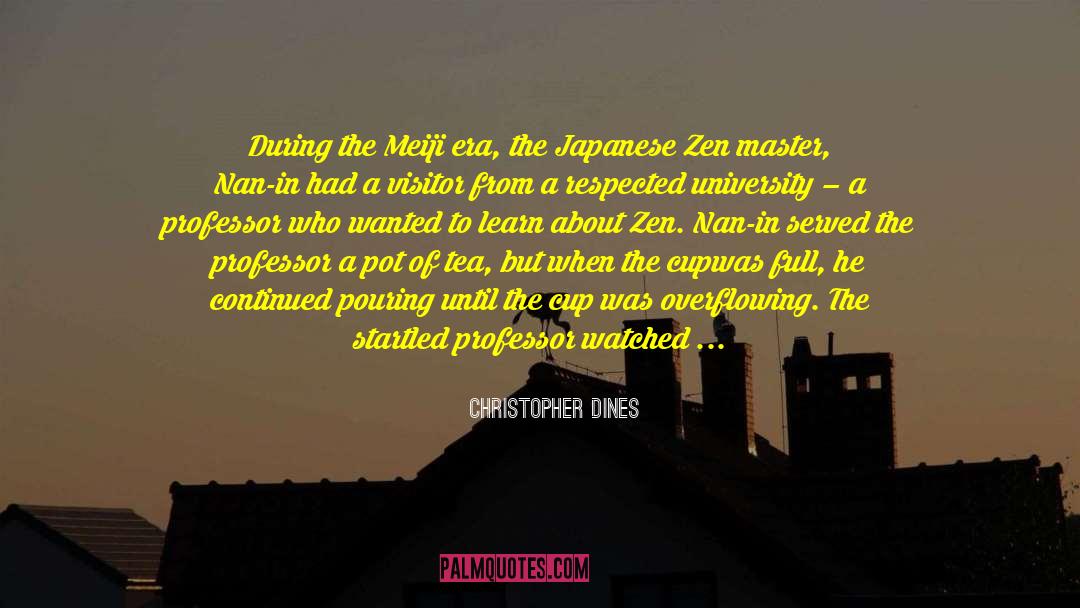
The age of glorious wars ended with the Meiji era. Today, all the stories of past wars have sunk to the level of those edifying accounts we hear from middle-aged noncoms in the military science department or the boasts of farmers around a hot stove. There isn't much chance now to die on the battlefield. [...] But now that old wars are finished, a new kind of war has just begun; this is the era for the war of emotion. The kind of war no one can see, only feel - a war, therefore, that the dull and insensitive won't even notice. But it's begun in earnest. The young men who have been chosen to wage it have already begun to fight. [...] And just as in the old wars, there will be casualties in the war of emotion, I think. It's the fate of our age. ~ Yukio Mishima
